May 16th, 2014 — 11:19pm
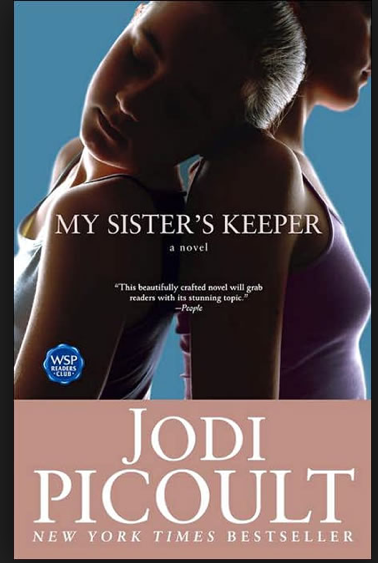
My Sister’s Keeper by Jodi Picoult – This was the second Jodi Picolt novel which I had the pleasure of reading. The first was The Storyteller, which was about the granddaughter of a holocaust survivor who finds herself friends with a former Nazi Concentration Camp guard who killed many prisoners in the same camp where her grandmother was imprisoned. The elderly ill Nazi asks the grown granddaughter to hasten his death. Picoult obviously has the ability to extract the ethical issues which can go to the heart and soul of our humanity. In My Sister’s Keeper a child develops a potentially fatal disease, which is unresponsive to various treatments. Blood transfusions, bone marrow transplant and ultimately a kidney transplant would be necessary to keep her alive. Things look bad for survival, as treatment options appear to be running out. The parents and brother don’t have the right “match” to be useful and a search for the right donor seems futile. However, it is possible for anther sibling, not yet conceived, to be the right match especially if there are genetic manipulation performed which would choose the right embryo – a type of carefully selected artificial insemination using the biological parents. It works out great and the parents see the stem cells from the umbilical cord of the newly born child, which would normally be thrown away being transferred to their ill daughter. On subsequent occasions when there is a relapse, there can be blood transfusions from the younger sister. Even a bone marrow transplant would be life saving.
The majority of the book takes place after Anna the younger sister now 13, has decided to visit an attorney, Campbell Chance and request that she be allowed to make her own decisions on what part of her body is given to her sister. In other words, she wants to be medically emancipated. The author gets into the head of each character as each chapter is written in the voice of one the important players in this real life drama. Katie is the older sister who has been sick most of her life and yet feels close to younger sister who is now resisting giving her what she needs to live. Jesse is the brother who in response to the emotional turmoil in the family becomes a juvenile delighquent and somewhat of a pyromaniac. Brian is the father who happens to be a brave fireman and a caring, loving father to all three of his children. Sara is the mother who clearly would do anything to save her daughter. She happens to be an attorney and it seemed natural to her that when there was going to be a trial to determine if the younger daughter is to be free to make her own decision, she will defend the parent’s point of view that they can make the decisions for Anna. Campbell is the attorney who Anna has chosen to represent her. It turns out that his personal story informs us of another aspect of the dilemma as do the the feelings and experience of Julie, the woman who is chosen by the court to be the guardian ad litem for Anna By providing us with riveting insight into each of these people, the reader is swept up as if we are living through this painful scenario.
Life of course is filled with potential heartaches, which we all must experience, but to varying degrees and at different times Even though we know about the disappointments of life, illness and death that may be around the corner, rarely are there things that we have never heard about. The situation of expecting one child to dedicate and perhaps risk her life to possibly save the life and maintain the well being of a sibling is quite unique. While not exactly the same, it reminds me of Sophie’s Choice. Should the author give us a happy ending or any ending in fact, is an interesting question. Ms. Picoult certainly did not shy away by leaving the ending to our imagination, which a lesser author may have done. We are challenged to think through the horns of this ethical dilemma. We make choices in our mind but we are able to see the where they are going in this story and perhaps in the future with modern technology.
Comment » | FG - Fiction General, FL - Fiction Legal, M - Medical
March 9th, 2014 — 7:47pm
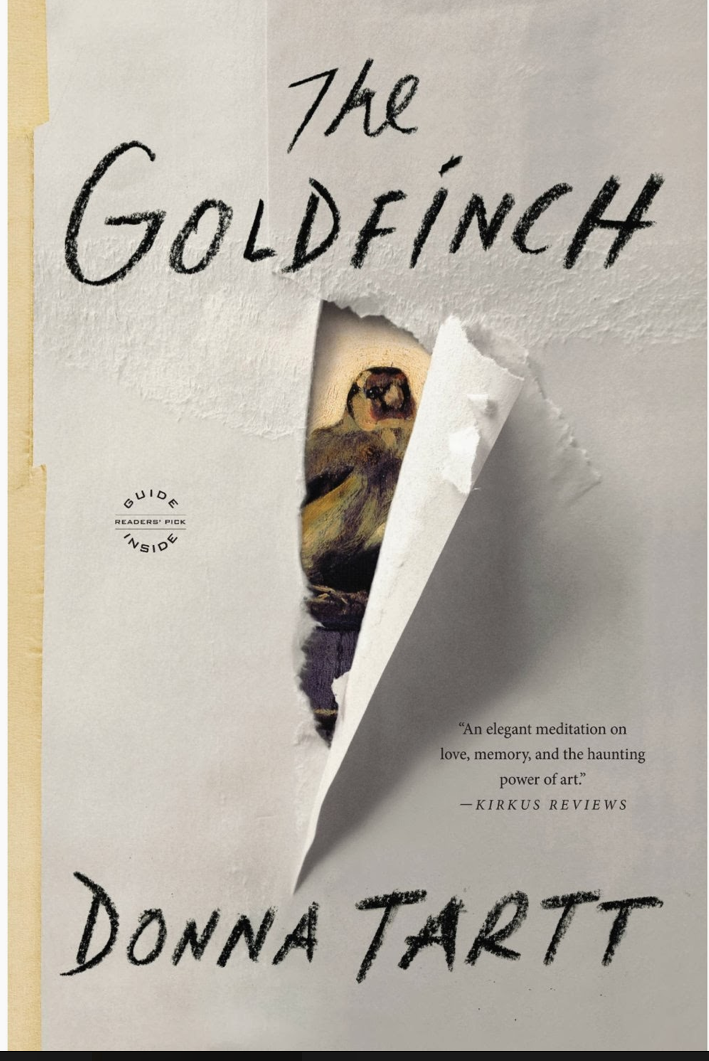 GOLDFINCH by Donna Tartt– I chose to read this book shortly after it emerged on the NY Times Best seller list and I read that people were overcrowding the Frick Museum in New York City where the Goldfinch painting by Carel Fairitus was being exhibited because it was the subject of this new popular book. For some reason that struck my fancy and I downloaded it on my iPod. Now having having completed the book, I read about the author and learned that she took 10 years between this and her last well received novel to complete this book. Also, the critics are comparing her style to Charles Dickens (who was never exactly my cup of tea). Having said this and feeling the book was definitely too long, I will give the author credit for an interesting plot and some good in-depth character development, which is always appealing to me. The novel is told in the first person which is an accepted literary mechanism but it seemed somewhat artificial to me when the writer in this case is describing exquisite details, memories, dialogue etc. that no one could possibly recall. The voice of this novel is Theo Decker. He is an early adolescent who is visiting a museum with his divorced mother when there is a tremendous bomb explosion. Young Theo finds himself alone in one part of the decimated museum with a dying old man who gives him his valuable ring and the painting (the novel namesake) which has survived the blast barely unscathed. His mother has died in the explosion and a wealthy Manhattan family of a school friend takes in Theo. Theo follows the directions of the dying old man from the museum and finds his relative, a kindly middle-aged man named Hobie. He gives him the ring and is taken under wing by him and taught all about furniture restoration which is his trade and profession. Throughout the book there are more details about furniture restoration than you would ever want to know. I am sure it is metaphoric or symbolic in some way, which I never understood. Theo meets Pippa, the granddaughter of the older man from the museum who is staying with Hobie while recovering from her injuries from the explosion. Theo had briefly seen her before the blast and was initially fascinated by her and subsequently develops a great love for her despite the fact that she is sent to school in another country and only periodically visits Hobie. Theo’s father then appears on the scene and takes him to live with him and his girlfriend in a run down area in Las Vegas. Theo all this time is hiding the famous painting as he tried to do throughout most of the book. Theo meets a young man with a Russian background by the name of Boris who becomes his closest friend and they spend high school years together. They will reunite later in the book. These two young men use a tremendous amount of drugs and alcohol throughout the book. We see the acute effects on them but for some reason, which didn’t make sense to me, we don’t see the deterioration and effects of large amounts of the substances, which they used. Theo and Boris have and thrilling adventure in Europe which has to do with the painting. As mentioned, all the characters with whom we spend time are consistent and well developed. The author obviously spent much time thinking about them and how to present them to us. She also is trying to share with us her philosophy of life. She not only demonstrates this in her storyline but also finds places in the novel to expound in great detail. No place is this more apparent than at the conclusion of the book where she goes on for what seems like numerous pages reviewing the lesson of life that Theo has learned. It didn’t work for me but remember I didn’t love Charles Dickens.
GOLDFINCH by Donna Tartt– I chose to read this book shortly after it emerged on the NY Times Best seller list and I read that people were overcrowding the Frick Museum in New York City where the Goldfinch painting by Carel Fairitus was being exhibited because it was the subject of this new popular book. For some reason that struck my fancy and I downloaded it on my iPod. Now having having completed the book, I read about the author and learned that she took 10 years between this and her last well received novel to complete this book. Also, the critics are comparing her style to Charles Dickens (who was never exactly my cup of tea). Having said this and feeling the book was definitely too long, I will give the author credit for an interesting plot and some good in-depth character development, which is always appealing to me. The novel is told in the first person which is an accepted literary mechanism but it seemed somewhat artificial to me when the writer in this case is describing exquisite details, memories, dialogue etc. that no one could possibly recall. The voice of this novel is Theo Decker. He is an early adolescent who is visiting a museum with his divorced mother when there is a tremendous bomb explosion. Young Theo finds himself alone in one part of the decimated museum with a dying old man who gives him his valuable ring and the painting (the novel namesake) which has survived the blast barely unscathed. His mother has died in the explosion and a wealthy Manhattan family of a school friend takes in Theo. Theo follows the directions of the dying old man from the museum and finds his relative, a kindly middle-aged man named Hobie. He gives him the ring and is taken under wing by him and taught all about furniture restoration which is his trade and profession. Throughout the book there are more details about furniture restoration than you would ever want to know. I am sure it is metaphoric or symbolic in some way, which I never understood. Theo meets Pippa, the granddaughter of the older man from the museum who is staying with Hobie while recovering from her injuries from the explosion. Theo had briefly seen her before the blast and was initially fascinated by her and subsequently develops a great love for her despite the fact that she is sent to school in another country and only periodically visits Hobie. Theo’s father then appears on the scene and takes him to live with him and his girlfriend in a run down area in Las Vegas. Theo all this time is hiding the famous painting as he tried to do throughout most of the book. Theo meets a young man with a Russian background by the name of Boris who becomes his closest friend and they spend high school years together. They will reunite later in the book. These two young men use a tremendous amount of drugs and alcohol throughout the book. We see the acute effects on them but for some reason, which didn’t make sense to me, we don’t see the deterioration and effects of large amounts of the substances, which they used. Theo and Boris have and thrilling adventure in Europe which has to do with the painting. As mentioned, all the characters with whom we spend time are consistent and well developed. The author obviously spent much time thinking about them and how to present them to us. She also is trying to share with us her philosophy of life. She not only demonstrates this in her storyline but also finds places in the novel to expound in great detail. No place is this more apparent than at the conclusion of the book where she goes on for what seems like numerous pages reviewing the lesson of life that Theo has learned. It didn’t work for me but remember I didn’t love Charles Dickens.
1 comment » | FG - Fiction General
February 16th, 2014 — 12:09pm
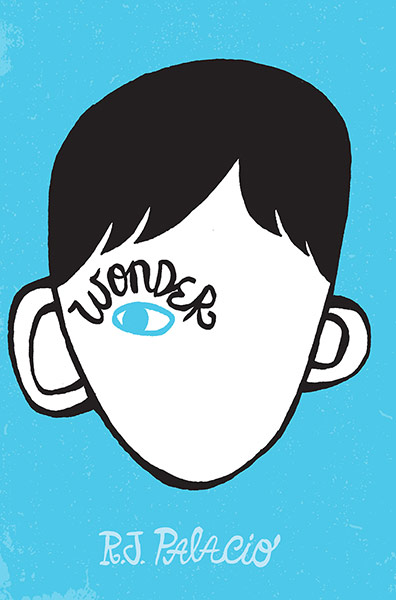 I decided to read this book because I had heard it was a very emotional and wonderful book from multiple people. This book is very inspiring and very different because it is written thoughtfully and caring through the eyes of someone you don’t see every day. Auggie, the main character, who feels like any other ordinary little boy inside, isn’t seen the same way by everybody else because he has a deformed face. Auggie has always been homeschooled and this book is about Auggie’s journey through his first year attending a real school—middle school. It is probably bad enough to be a new kid, let alone having a deformed face and being at a real school for the first time in your life—well imagine it would be like for Auggie.
I decided to read this book because I had heard it was a very emotional and wonderful book from multiple people. This book is very inspiring and very different because it is written thoughtfully and caring through the eyes of someone you don’t see every day. Auggie, the main character, who feels like any other ordinary little boy inside, isn’t seen the same way by everybody else because he has a deformed face. Auggie has always been homeschooled and this book is about Auggie’s journey through his first year attending a real school—middle school. It is probably bad enough to be a new kid, let alone having a deformed face and being at a real school for the first time in your life—well imagine it would be like for Auggie.
What I really liked about Wonder is that the author, R.J. Palaciodid a great job of capturing Auggie’s perspective and she also showed the perspectives of other people in Auggie’s life by telling the story from the views of other people in Auggie’s life. I recommend this book because it really makes the sadness, happiness, enjoyment, pleasure, and emotion come to life in the reader’s eyes and in the character’s eyes. I recommend this book to people who like to see real life—both the hardships and the happy moments.
1 comment » | FG - Fiction General, T - Recommended for Teenagers, Uncategorized
December 16th, 2013 — 11:44am
 Serena by Ron Rash– In a recent book review of the best seller Gone Girl , I noted that despite that book being a very exciting mystery, there was a paucity of information about the background and psychological make up of the two protagonists. Similarly, Serena offers us two very strong characters, Serena and her husband Pemberton, with an interesting but certainly not a page turning, edge of your seat mystery. There is no significant in-depth backstory that really allows us to understand the characters and why they are who they are and how they got there. This certainly does not have to be the mission of every novel but without it we have to evaluate what have we been given? In this case it is an insight into the lives of the mostly men and some women who cut, sawed and hacked their way across the Appalachian mountains of North Carolina, Tennessee and surrounding areas in the late 1920s and early 30s’ while the country was in a depression. We came to appreciate the hardship and, at times, danger to life and limb that these lumbermen experienced. We get a glimpse at the movement to develop a national park system and the conflict with the entrepreneurs who were buying up the land to take the trees and minerals while essentially leaving it bare. We also meet a unique married couple who are not only the bosses of a company that is engaged in these practices but who also embody a mean spirited perhaps “evil” nature. They will think nothing of endangering their workers, manipulating and lying to potential business partners and doing whatever has to be done to achieve their ends. This includes a willingness to murder anyone. Thus the book in one sense is a morality play with the workers talking among themselves acting like a Greek chorus highlighting the code of ethics or rather lack of them which are being acted out. Serena, herself emerges as a person who burnt her bridges behind her (although we don’t quite really understand what they were made of) and would do anything to be the timber baroness of the US and then of Brazil. Her singlemindedness becomes frightening and is made of the stuff that would make her an ideal role for any great actress to undertake when Serena , the movie,is ultimately made.
Serena by Ron Rash– In a recent book review of the best seller Gone Girl , I noted that despite that book being a very exciting mystery, there was a paucity of information about the background and psychological make up of the two protagonists. Similarly, Serena offers us two very strong characters, Serena and her husband Pemberton, with an interesting but certainly not a page turning, edge of your seat mystery. There is no significant in-depth backstory that really allows us to understand the characters and why they are who they are and how they got there. This certainly does not have to be the mission of every novel but without it we have to evaluate what have we been given? In this case it is an insight into the lives of the mostly men and some women who cut, sawed and hacked their way across the Appalachian mountains of North Carolina, Tennessee and surrounding areas in the late 1920s and early 30s’ while the country was in a depression. We came to appreciate the hardship and, at times, danger to life and limb that these lumbermen experienced. We get a glimpse at the movement to develop a national park system and the conflict with the entrepreneurs who were buying up the land to take the trees and minerals while essentially leaving it bare. We also meet a unique married couple who are not only the bosses of a company that is engaged in these practices but who also embody a mean spirited perhaps “evil” nature. They will think nothing of endangering their workers, manipulating and lying to potential business partners and doing whatever has to be done to achieve their ends. This includes a willingness to murder anyone. Thus the book in one sense is a morality play with the workers talking among themselves acting like a Greek chorus highlighting the code of ethics or rather lack of them which are being acted out. Serena, herself emerges as a person who burnt her bridges behind her (although we don’t quite really understand what they were made of) and would do anything to be the timber baroness of the US and then of Brazil. Her singlemindedness becomes frightening and is made of the stuff that would make her an ideal role for any great actress to undertake when Serena , the movie,is ultimately made.
Comment » | FG - Fiction General
November 19th, 2013 — 1:03am
 Americanah by Chimamanda Ngozi Adichie This is a novel about Ifemelu an attractive bright young woman who grows up in Lagos, a city in Nigeria. She falls in love with Obinze and they seem to be a perfect pair meant for each other. However like many educated young people from Nigeria she is driven to explore horizons beyond her environment and finds a way to come to America. We are able to follow her on this at times torturous journey. We come to understand her relationships with the people that she meets and her love life with several men as well as her career which includes, not surprisingly, being a writer and eventually a blogger. We see through her eyes how she is viewed by Americans both black and white and the distinctions that she draws between Non-African Black and African Black. The reader gains thoughtful and at times jolting insights into the complexities of the meaning of what might be considered an incidental task and that is how she decides to have her hair done. Ifemelu’s decision to return to Nigeria allows the reader to gain a further prospective on some of the views of her countrymen and women towards America as well as her view of her country based on her years of living in the U.S. Make no mistake, Ifemelu the main character should not be considered a stereotype of Africans or even of Nigerians. She is a product of her environment and all the experiences to which she has been exposed. Her life and the choices which she makes can be understood and identified with by many of the readers from different backgrounds. The idea that there is no single story for one group of people is something very important to the author.
Americanah by Chimamanda Ngozi Adichie This is a novel about Ifemelu an attractive bright young woman who grows up in Lagos, a city in Nigeria. She falls in love with Obinze and they seem to be a perfect pair meant for each other. However like many educated young people from Nigeria she is driven to explore horizons beyond her environment and finds a way to come to America. We are able to follow her on this at times torturous journey. We come to understand her relationships with the people that she meets and her love life with several men as well as her career which includes, not surprisingly, being a writer and eventually a blogger. We see through her eyes how she is viewed by Americans both black and white and the distinctions that she draws between Non-African Black and African Black. The reader gains thoughtful and at times jolting insights into the complexities of the meaning of what might be considered an incidental task and that is how she decides to have her hair done. Ifemelu’s decision to return to Nigeria allows the reader to gain a further prospective on some of the views of her countrymen and women towards America as well as her view of her country based on her years of living in the U.S. Make no mistake, Ifemelu the main character should not be considered a stereotype of Africans or even of Nigerians. She is a product of her environment and all the experiences to which she has been exposed. Her life and the choices which she makes can be understood and identified with by many of the readers from different backgrounds. The idea that there is no single story for one group of people is something very important to the author.
After I completed this book, I wanted to know to know more about the author.I found this video clip of Ngozi Adichie giving the prestigious TED lecture. I highly recommend it to anyone who may be considering spending time with this novel as it will give you an idea of intelligence and thoughtfulness of the author
The link is :
http://www.ted.com/talks/chimamanda_adichie_the_danger_of_a_single_story.html?quote=559
There was a passage in the book which was one of several blogs written by Ifemelu, which struck me as a clear descriptions of racism in America. While it is only a small part of the book, I thought it was worth repeating and using it to demonstrate the value of reading this book:
Understanding America for the Non-American Black: A few Explanations of What Things Really Mean
1-Of all their tribalisms, Americans are most uncomfortable with race, If you are having a conversation with an American, and you want to discuss something racial that you find interesting, and the American says, “ Oh, it’s simplistic to say it’s race, racism is so complex,” it means they just want you to shut up already, Because of course racism is complex. Many abolitionists wanted to free the slaves but didn’t want black people living nearby. Lots of folk today don’t mind a black nanny or black limo driver. But they sure as hell mind a black boss. What is simplistic is saying “It’s so complex.” But shut up anyway, especially if you need a job/favor from the American in question.
2. Diversity means different things to different folks. If a white person is saying a neighborhood is diverse, they mean nine percent black people (the minute it gets to ten percent black people, the white folk move out.) If a black person says diverse neighborhood, they are thinking forty percent black.
3. Sometimes they say “culture” when they mean race. They say a film is “mainstream” when they mean “white folks like it or made it,” When they say “urban” it means black and poor and possibly dangerous and potentially exciting. “Racially charged” means we are uncomfortable saying “racist.”
Comment » | FG - Fiction General, FR - Fiction Romance
November 1st, 2013 — 12:29am
 The Circle by Dave Eggers Some of you may have read George Orwell’s 1949 book titled 1984 in which he envisioned a time in the future when “ Big Brother” will always be watching you. That book predicted a society in which everyone was under scrutiny by the omnipresent government. Now almost 65 years after the publication of that book Dave Eggers comes out with The Circle in which he envisions a society where everyone is under scrutiny by everyone else.
The Circle by Dave Eggers Some of you may have read George Orwell’s 1949 book titled 1984 in which he envisioned a time in the future when “ Big Brother” will always be watching you. That book predicted a society in which everyone was under scrutiny by the omnipresent government. Now almost 65 years after the publication of that book Dave Eggers comes out with The Circle in which he envisions a society where everyone is under scrutiny by everyone else.
The story opens as Mae, a young woman a few years out of college is about to take a job with the most avant-garde company (think a combination of Apple, Google, Microsoft). As expected she encounters a beautiful campus with every amenity to make the life of it’s employees comfortable and worry free. She soon learns that to do the job that is expected, one must be responsive to your customers and co-workers. There may seem to be nothing unusual about this well-known business principle. But the day of easy communication via computer, phone and now a special wristband is easy to do but involves very large numbers of interested coworkers and the now involved general public which in turn requires massive meticulous tracking procedures. So at a worker’s desk at this wonderful company there are at least 2 large computer screen keeping track of 1000s of customer responses and a growing numbers of “friends” and co-workers with whom you meet and interact The number of screens at your desk will soon grow as will the time a conscientious worker spends responding to messages. There is of course some built in competition for those who want to be recognized for doing a good job. But no worry, workers can stay overnight in special beautiful hotel like dormitories and there are all sorts of educational and social programs on campus.
There are special programs built in to keep track where everybody is at any moment (our new cell phones do that today). This is just the tip of the iceberg. The story of The Circle is not just about the ever increasing amount of information and data that can be accumulated, tracked and used for seemingly good purposes. The book is also about a handful of people in addition to Mae and Annie (her friend who brought her to the company and has been one of her biggest advocates) and how this new information culture is impacting on them and the people around them. For example, Mae’s parents initially are so happy to benefit by being given free quality health insurance because Mae is their daughter. They soon will regret they and their daughter ever had anything to do with this massive corporation. The company comes up with an invention in which a person wears a camera around his or her neck and just about everything they do and experience is traceable on this world wide communication system. A politician volunteers to wear this camera and becomes “ transparent” so no one can ever accuse her of being two faced, secretive or untruthful because everything she does is known. Soon most politicians end up doing the same thing.
Most intriguing are the three founders or “ leaders” of the company (remind you of the term used for the honchos in China?). There is Ty, the young techno genius who may not have thought through all the implications of his initial innovations, which led to the founding of the company. There is Bailey, another one of the big three leaders, who believes that knowing and seeing all will lead to a better world for all. Then there is Stetson , the cold calculating man who realizes that the more you control, the more money the company can make. By encompassing these 3 characteristics as three different people who together embody the company, we are better able to understand the essence of The Circle (name of the company) which is about to come around 360 degrees and essentially take over the lives of everyone.
Do not fret, you can safely read this book on your electronic reader. You will have control on your Facebook who you want to friend and you can decide if you want to Tweet. It also isn’t necessary for you to carry an open camera for everyone on earth to have access to you. But what if everyone else did this and suggested that you had something to hide? Perhaps the circle is closing faster than we realize.
Comment » | FG - Fiction General, FSF - Fiction Science Fiction
September 27th, 2013 — 10:51am
 The Light Between Oceans by H. L. Stedman – Tom Sherbourne is a young World War I veteran who takes an honorable job as a lighthouse keeper 100 miles off the coast of Australia. On leave in the mainland he meets and falls in love and marries Isabel who is very happy to join him in the lighthouse keepers home on an isolated island. Still early in the book, we learn of the all important incident where a small boat washes ashore with a dead man in it and a new born baby. By now Isabel has had three miscarriages and Tom and Isabel conclude the mother of the baby must have been lost at sea. They bury the man and keep and raise the baby as their own especially since it coincides with her latest expected but failed childbirth. As the story unfolds we learn much more about Tom and Isabel and about other people whose lives are related to this incident. We become drawn in to the complexities and deepest feeling of many of them. The author allows us to understand where the characters come from and where they are going . She puts us inside their heads as they struggle with their psychological pain and their decision-making processes. It is remarkable that included in this study of people is an insight into the baby girl who we meet shortly after her birth and watch her develop for the first five years of her life. The reader is drawn to the many interrelated characters in the book. To understand them is to empathize and like them. The book also gives the reader an insight into the impact of World War I on not only the participants and the returning young veterans but on the so many parents who never recover from what the war did to their families. But most of all this is a story about one big ethical dilemma that has the power to rip you apart if you put yourself in the shoes of all involved. This is a well-written novel which grabs you and makes you not want to put it down. When I finally did put it down after completing it I realize that it stirs up thoughts about a topic, which I have been thinking and writing about in recent months. That is the powerful desire of people to find their hidden roots and make personal contact with close relatives from whom they have been separated at an early stage in their lives or those related to them. ( See my blog on this subject ) . Whenever you encounter a book that holds your attention as this one did and stimulates interesting thoughts, it certainly is a book that deserves recommending to others
The Light Between Oceans by H. L. Stedman – Tom Sherbourne is a young World War I veteran who takes an honorable job as a lighthouse keeper 100 miles off the coast of Australia. On leave in the mainland he meets and falls in love and marries Isabel who is very happy to join him in the lighthouse keepers home on an isolated island. Still early in the book, we learn of the all important incident where a small boat washes ashore with a dead man in it and a new born baby. By now Isabel has had three miscarriages and Tom and Isabel conclude the mother of the baby must have been lost at sea. They bury the man and keep and raise the baby as their own especially since it coincides with her latest expected but failed childbirth. As the story unfolds we learn much more about Tom and Isabel and about other people whose lives are related to this incident. We become drawn in to the complexities and deepest feeling of many of them. The author allows us to understand where the characters come from and where they are going . She puts us inside their heads as they struggle with their psychological pain and their decision-making processes. It is remarkable that included in this study of people is an insight into the baby girl who we meet shortly after her birth and watch her develop for the first five years of her life. The reader is drawn to the many interrelated characters in the book. To understand them is to empathize and like them. The book also gives the reader an insight into the impact of World War I on not only the participants and the returning young veterans but on the so many parents who never recover from what the war did to their families. But most of all this is a story about one big ethical dilemma that has the power to rip you apart if you put yourself in the shoes of all involved. This is a well-written novel which grabs you and makes you not want to put it down. When I finally did put it down after completing it I realize that it stirs up thoughts about a topic, which I have been thinking and writing about in recent months. That is the powerful desire of people to find their hidden roots and make personal contact with close relatives from whom they have been separated at an early stage in their lives or those related to them. ( See my blog on this subject ) . Whenever you encounter a book that holds your attention as this one did and stimulates interesting thoughts, it certainly is a book that deserves recommending to others
Comment » | FG - Fiction General
September 21st, 2013 — 5:58pm
Old Filth by James Gardau – 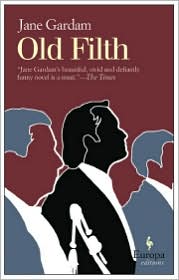 This novel is the story of the life and death of Sir Edward Feathers, subject of the British Empire. He happened to be a barrister who went on to be a judge. The origin of his name is Failed In London Try Hong Kong. Although this moniker stuck with him and may have been hurtful although that was never mentioned. He was far from a failure. In fact he is an example of what the human spirit can accomplish no matter what kind of early childhood cards are dealt to you. But it is also a tale of the scars of early childhood.
This novel is the story of the life and death of Sir Edward Feathers, subject of the British Empire. He happened to be a barrister who went on to be a judge. The origin of his name is Failed In London Try Hong Kong. Although this moniker stuck with him and may have been hurtful although that was never mentioned. He was far from a failure. In fact he is an example of what the human spirit can accomplish no matter what kind of early childhood cards are dealt to you. But it is also a tale of the scars of early childhood.
Old Filth started off life by losing his mother 3 days after he was born outside of England. His father arranged for the wet nurse and her young daughter to take him in in their house. It was the teen age Malaysian girl who took care of him for his first five years and it seemed that he had no other parental figure. He was then sent to England to be raised by a foster family whom he felt never loved or cared for him. He did have a relationship with two young cousins who also were involved in this extended foster family. Those children who came from the far-flung Empire were known as Raj Orphans. His father a World War I veteran and an alcoholic, paid for his schools although he didn’t visit him. As an older teen he felt at home with a school buddy’s family on holidays. When World War II broke out, although he was almost of college age, his father arranged for him to be sent to Singapore because of concern about the German bombings in the same manner as younger children were being evacuated from Europe. That turned out to be an ill fated boat trip and although he had passed his entrance exams for Oxford, he enlisted in the army. He was assigned to a remote part of England to guard Queen Mary and amazingly developed a somewhat friendly relationship with her. Post war he pursued his education and then a successful legal career in Hong Kong where he even becomes a prominent judge
He was married to Betty for many years, but did not have any children. We ultimately learn that the marriage may not have been what he thought it was, as it turns out that she had an affair with a man who became a neighbor later in his life. What shines through this tale is that despite his great success and even a seemingly happy marriage (despite the few indiscretions by his wife), was a deep feeling of emptiness and frequently feelings of rejection. Much of the book focuses on his loneliness after his wife dies in their old age. The sadness of his reflections suggests that he always felt something was missing in his life. Could it be that he didn’t have the love of parental figures when he really needed it?
While I found the numerous transitions back and forth to different stages in his life quite disruptive and distracting, it did allow for the reader to examine and understand his youth and middle years while being with him and seeing his life from his vantage point as an older man. I do admit for me at times these were tedious journeys.
This book is dealing with memories and the significance of past experiences. In this regard, the author reminds us how a single incident can stay with one for a lifetime even if that memory is a distorted one. This situation was described in just a few pages of one important event in Filth’s life. This dates back to his preteen years where he and his cousins were with the foster mother whom they despised because of the way she treated them. They even spoke among themselves how they would like to kill her. Then in an incident at the top of a large staircase, the young Filth, struggling with her about something or other, pushes the foster mother and she falls down the stars leading to her death. In his old age, he wishes to confess this deed to a Priest in the presence of one his cousins, who had been there with him at the time of the incident. He relates how the foster mother was found dead at the foot of the stairs after he pushed her. The cousin mentions that actually the woman died the next day at the hospital and was found to have end stage cancer of which she would have died shortly anyway. Filth is stunned and says, “I never knew that!” How would his feeling have been different about himself and his life had he known he did not cause her death? How would all his trials and tribulations been different if he had been loved and listened to throughout his years?
Comment » | FG - Fiction General
August 17th, 2013 — 12:37am
 Please Look After Mom by Kyung-Souk Shin – This book is about a Korean Family in which early in the story we learn that the elderly mother, the matriarch of the family, is missing. She was coming to Seoul, the big city, with her husband when their hand grasp was loosened in a crowded train station. This is the premise which the author uses to examine the role of the mother in this family, at the same times she is able to touch upon universal issues in relationships in every culture. This is particularly poignant where mother comes from poverty and can’t give her children more than the sweat of her brow and the food off of her plate. To give your child what you never had is an understandable dream of a parent who saw so much around her that she couldn’t reach. For some parents it may be an education or even the ability read, freedom from hunger , a career, travel, knowledge of the world etc. How much should a mother show of her insecurity to her children and will this change with age when the children hopefully can obtain some of the things the parents could never have. Then there are secrets of the parents that the children never know. Even if the children think they know the secrets and what went on behind the scenes, they may not know the whole story. Did the children really know about Father and the other woman? Would they dare even to think that mother had a secret man friend . Certainly this book makes the reader reflect on whether we really understood our own mothers as well as whether our children really know us. Perhaps in guise of protecting a child, there is less sharing of goals, frustrations and even triumphs. Do grown children do the same thing with parents? Does this lead to less closeness and empathy for each other? Through the eyes of the family members we also appreciate how there can be delayed or postponed expressions of appreciation for each other and how one might regret this as time runs out. A worthy lesson of this book. As beautiful and as poignant as some of the insights of this book might be, it is quite repetitious. It loses much of it’s value as it hammers home the lessons and points it is making. It is one thing to tug at the reader’s heartstrings and try to make universal truths about essence of motherhood. However, to rehash it from several points of view, including a view of bird looking in some family interactions (bird’s eye view?) doesn’t not make a pleasant reading experience in this writer’s opinion. It seemed to me, there should have been some fresh new understanding and insight that was lacking in this book. One of the children of the mother in this story was described as being a successful author. She was frequently at odds with her mother and had much grief when her mother was gone before she could really reconcile. It was enough perhaps to bring about this novel.
Please Look After Mom by Kyung-Souk Shin – This book is about a Korean Family in which early in the story we learn that the elderly mother, the matriarch of the family, is missing. She was coming to Seoul, the big city, with her husband when their hand grasp was loosened in a crowded train station. This is the premise which the author uses to examine the role of the mother in this family, at the same times she is able to touch upon universal issues in relationships in every culture. This is particularly poignant where mother comes from poverty and can’t give her children more than the sweat of her brow and the food off of her plate. To give your child what you never had is an understandable dream of a parent who saw so much around her that she couldn’t reach. For some parents it may be an education or even the ability read, freedom from hunger , a career, travel, knowledge of the world etc. How much should a mother show of her insecurity to her children and will this change with age when the children hopefully can obtain some of the things the parents could never have. Then there are secrets of the parents that the children never know. Even if the children think they know the secrets and what went on behind the scenes, they may not know the whole story. Did the children really know about Father and the other woman? Would they dare even to think that mother had a secret man friend . Certainly this book makes the reader reflect on whether we really understood our own mothers as well as whether our children really know us. Perhaps in guise of protecting a child, there is less sharing of goals, frustrations and even triumphs. Do grown children do the same thing with parents? Does this lead to less closeness and empathy for each other? Through the eyes of the family members we also appreciate how there can be delayed or postponed expressions of appreciation for each other and how one might regret this as time runs out. A worthy lesson of this book. As beautiful and as poignant as some of the insights of this book might be, it is quite repetitious. It loses much of it’s value as it hammers home the lessons and points it is making. It is one thing to tug at the reader’s heartstrings and try to make universal truths about essence of motherhood. However, to rehash it from several points of view, including a view of bird looking in some family interactions (bird’s eye view?) doesn’t not make a pleasant reading experience in this writer’s opinion. It seemed to me, there should have been some fresh new understanding and insight that was lacking in this book. One of the children of the mother in this story was described as being a successful author. She was frequently at odds with her mother and had much grief when her mother was gone before she could really reconcile. It was enough perhaps to bring about this novel.
Comment » | FG - Fiction General
March 22nd, 2013 — 9:25pm
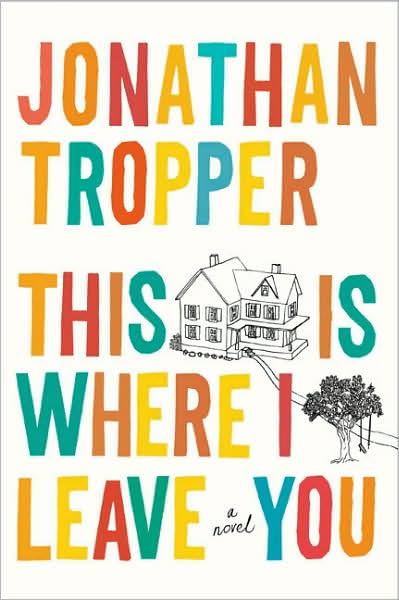 This is Where I Leave You by Jonathan Tropper
This is Where I Leave You by Jonathan Tropper
A father, the patriarch of the family dies. His three sons and a daughter with their families or significant other return home and join the widow to sit Shiva for one week after they are told that this is the surprising and uncharacteristic wish of the deceased. (Perhaps he wanted them to get together?) This becomes the setting for the author through the eyes of one of the sons, to explore the overt lives as well as the inner thoughts of all these participants. Sex, love or the lacks of the latter are the main themes. There is certainly plenty of the former. Mr Tropper has the ability to show his protagonist’s every sexual thought in a natural manner which I am sure most men and many women certainly will acknowledge has passed through their minds at one time or the other. He also creates a potpourri of affairs, encounters in the present or rekindled from the past, old flames, new flames, what could have been, what never should have been, fulfilled love, unfulfilled love and a lot more, Each one of these events is very real and I am sure just about every reader knows of some these first hand or knows about them existing somewhere in their family. But all of them in one family? It makes this a far fetched reading experience, albeit quite interesting. The interaction of these family members who on one hand seem to be so different and antagonistic to each other actually turn out to also feel close to each other and deep down quite caring of their family members. As we appreciate the events of their childhood we are also led to consider what role did their parents have in them ending up with this family bond? This stimulates in this writer wondering how our own kids family experiences will influence their relationships later in life when we are gone. It did not escape us that one of the parents (the mother) was some kind of a therapist although a quirky one at that. She had her own theories how to raise children, Probably all therapists, based on their experience treating people and seeing the results of their childhood on their adult problems, have ideas how to better raise their own children. This reminds me of one of few Yiddish expressions that I know : Es vet gornit helfen!: Nothing will help!!
In my opinion what is missing in this book and what prevents it from being a great novel is that there is no real plot. In the future when the author comes up with an intriguing story line and adds his uncanny ability to capture inner feelings and thoughts, I believe he will bring his writing to a new award winning level.
Comment » | FG - Fiction General


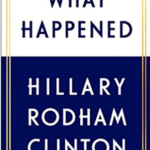
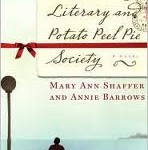
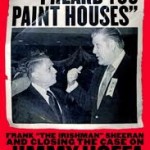

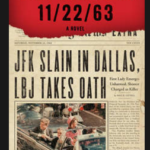

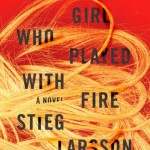
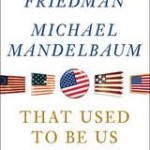
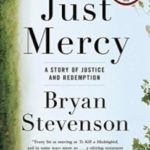











 Please Look After Mom by Kyung-Souk Shin – This book is about a Korean Family in which early in the story we learn that the elderly mother, the matriarch of the family, is missing. She was coming to Seoul, the big city, with her husband when their hand grasp was loosened in a crowded train station. This is the premise which the author uses to examine the role of the mother in this family, at the same times she is able to touch upon universal issues in relationships in every culture. This is particularly poignant where mother comes from poverty and can’t give her children more than the sweat of her brow and the food off of her plate. To give your child what you never had is an understandable dream of a parent who saw so much around her that she couldn’t reach. For some parents it may be an education or even the ability read, freedom from hunger , a career, travel, knowledge of the world etc. How much should a mother show of her insecurity to her children and will this change with age when the children hopefully can obtain some of the things the parents could never have. Then there are secrets of the parents that the children never know. Even if the children think they know the secrets and what went on behind the scenes, they may not know the whole story. Did the children really know about Father and the other woman? Would they dare even to think that mother had a secret man friend . Certainly this book makes the reader reflect on whether we really understood our own mothers as well as whether our children really know us. Perhaps in guise of protecting a child, there is less sharing of goals, frustrations and even triumphs. Do grown children do the same thing with parents? Does this lead to less closeness and empathy for each other? Through the eyes of the family members we also appreciate how there can be delayed or postponed expressions of appreciation for each other and how one might regret this as time runs out. A worthy lesson of this book. As beautiful and as poignant as some of the insights of this book might be, it is quite repetitious. It loses much of it’s value as it hammers home the lessons and points it is making. It is one thing to tug at the reader’s heartstrings and try to make universal truths about essence of motherhood. However, to rehash it from several points of view, including a view of bird looking in some family interactions (bird’s eye view?) doesn’t not make a pleasant reading experience in this writer’s opinion. It seemed to me, there should have been some fresh new understanding and insight that was lacking in this book. One of the children of the mother in this story was described as being a successful author. She was frequently at odds with her mother and had much grief when her mother was gone before she could really reconcile. It was enough perhaps to bring about this novel.
Please Look After Mom by Kyung-Souk Shin – This book is about a Korean Family in which early in the story we learn that the elderly mother, the matriarch of the family, is missing. She was coming to Seoul, the big city, with her husband when their hand grasp was loosened in a crowded train station. This is the premise which the author uses to examine the role of the mother in this family, at the same times she is able to touch upon universal issues in relationships in every culture. This is particularly poignant where mother comes from poverty and can’t give her children more than the sweat of her brow and the food off of her plate. To give your child what you never had is an understandable dream of a parent who saw so much around her that she couldn’t reach. For some parents it may be an education or even the ability read, freedom from hunger , a career, travel, knowledge of the world etc. How much should a mother show of her insecurity to her children and will this change with age when the children hopefully can obtain some of the things the parents could never have. Then there are secrets of the parents that the children never know. Even if the children think they know the secrets and what went on behind the scenes, they may not know the whole story. Did the children really know about Father and the other woman? Would they dare even to think that mother had a secret man friend . Certainly this book makes the reader reflect on whether we really understood our own mothers as well as whether our children really know us. Perhaps in guise of protecting a child, there is less sharing of goals, frustrations and even triumphs. Do grown children do the same thing with parents? Does this lead to less closeness and empathy for each other? Through the eyes of the family members we also appreciate how there can be delayed or postponed expressions of appreciation for each other and how one might regret this as time runs out. A worthy lesson of this book. As beautiful and as poignant as some of the insights of this book might be, it is quite repetitious. It loses much of it’s value as it hammers home the lessons and points it is making. It is one thing to tug at the reader’s heartstrings and try to make universal truths about essence of motherhood. However, to rehash it from several points of view, including a view of bird looking in some family interactions (bird’s eye view?) doesn’t not make a pleasant reading experience in this writer’s opinion. It seemed to me, there should have been some fresh new understanding and insight that was lacking in this book. One of the children of the mother in this story was described as being a successful author. She was frequently at odds with her mother and had much grief when her mother was gone before she could really reconcile. It was enough perhaps to bring about this novel.